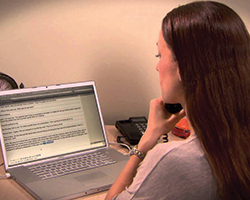 Accommodating hard-of-hearing or deaf employees need not be the intimidating effort many employers anticipate, points out Sue Kay Kneifel, statewide coordinator of the Arizona Department of Security’s Deaf and Hard-of-Hearing Services, which has made educating employers on this workforce issue its focus this year.
Accommodating hard-of-hearing or deaf employees need not be the intimidating effort many employers anticipate, points out Sue Kay Kneifel, statewide coordinator of the Arizona Department of Security’s Deaf and Hard-of-Hearing Services, which has made educating employers on this workforce issue its focus this year.
In Arizona, 1.145 million people age 20 and older are affected with a hearing loss of at least 25 decibels (ear plugs, by comparison, dampen sound by about 20 decibels). Accommodating their needs may be as simple as using text messaging through Relay Conference Captioning, a free phone relay service offered by the State of Arizona; having adjustable blinds to block glare so an employee can read lips; or, if the work space is a cubicle, either reconfiguring it so the desk faces the entry or adding a mirror — “which you can pick up at the Dollar Store,” Kneifel says — angled to the entry. There are also special telephones that can amplify sound and can connect via Bluetooth to the user’s hearing aid.
Emphasizing the importance of attitude, Kneifel says, “Friendly goes a long way” — as does willingness of supervisors and co-workers to learn some basic friendly communication. Even if the impetus for the hiring is changes in the law, “once they have the employee there, an attitude change follows,” Kneifel relates.
What is the law now? Seven percent of a company’s workforce — at every employment level — must be a person with a disability. And the Office of Federal Contract Compliance is starting to closely monitor businesses that contract with the federal government, says Kneifel.
Whether or not a business needs to hire an interpreter depends on the need of the individual. Kneifel recommends first talking to the employee. “The employee wants to fit in, to not be out of the norm.” However, she points out, with a business situation in which the employer will hold the employee accountable for the job, it may be wise to provide one. This also covers the employer should there be any question as to whether that employee was told what he needed to know.
Boeing, for one, has an interpreter on staff full time. This was a project of now-former Boeing executive Bill Kipper, relates Michele Michaels, hard of hearing specialist with the Arizona Commission for the Deaf and the Hard of Hearing. “He saw how being deaf isolated employees, so he created this pilot project … to make sure employees feel integrated and valued, for both meetings and quick one-on-ones with a boss or conversation with a co-worker. And he found it works out more cost-effective than just bringing one in for a specific meeting.”
The loyalty of an employee with a disability is greater, so turnover is less, Kneifel says, noting that produces a cost reduction that benefits the employer, as does the niche market created through the loyalty of that employee’s friends and family.
 Closed Captioning for Business
Closed Captioning for Business
Hearing loss is the biggest disability group, and last fall Arizona implemented a free service employers can use throughout the state: Relay Conference Captioning. Offered weekdays from 8 a.m. to 6 p.m. (and arrangements can be made for use at other times), this provides a caption of the conversation displayed wirelessly to the person’s PC. Transcripts may also be provided — or not, if the employer is concerned about confidentiality. This may be used by a person physically in attendance at a meeting or telecommuting. RCC uses the same high-quality captioners that provide closed captioning for live television, news, sports and weather to deliver live, real-time text streamed to an Internet-connected computer, mobile device or tablet.












